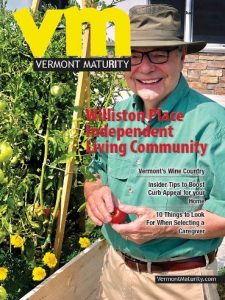 Don Carpenter spent nearly three decades of his professional life working in construction. But in the early 2000s, he decided to pursue a new career: taxidermy. He completed a 13-week course at Northwood Institute of Taxidermy in Pennsylvania in 2002, came home to Charlotte, posted a sign at the end of his driveway and launched Wildwood Taxidermy. Nine years later, Carpenter runs a successful business out of a workshop adjacent to his house, catering to a loyal clientele of hunters who ask him to preserve the animals they’ve bagged on hunting trips.
Don Carpenter spent nearly three decades of his professional life working in construction. But in the early 2000s, he decided to pursue a new career: taxidermy. He completed a 13-week course at Northwood Institute of Taxidermy in Pennsylvania in 2002, came home to Charlotte, posted a sign at the end of his driveway and launched Wildwood Taxidermy. Nine years later, Carpenter runs a successful business out of a workshop adjacent to his house, catering to a loyal clientele of hunters who ask him to preserve the animals they’ve bagged on hunting trips.
Carpenter’s shift from carpentry came in part out of necessity — he says he underwent eight orthopedic surgeries — but also represented a decision to point his life in a new direction. Carpenter was in the latter half of his 40s when he took up taxidermy, and the career change provided him with the pleasure of working for himself.
“I like being self-employed and working at home, it can’t get any better than that,” Carpenter said with a chuckle.
By starting Wildwood Taxidermy, Carpenter joined a portion of the population, usually people in their 50s and 60s, entering their “third age” by embarking on a new career, taking up a new hobby or pursuing a lifelong passion.
“When you get to be older, you can experiment,” said Sarah Gillen, a life and business coach from Montpelier. “If you really want to be authentic in what you bring forth into the world, now’s the time. As you get older, you get the sense that the chances you have are fewer.”
The first step in making a life transition, perhaps obviously, requires finding a goal to pursue. Gillen said the transition can range from starting a business to volunteering to learning how to paint.
“The process of going inside, spending some time exploring, giving yourself a chance to undo the definitions of who you think you are, takes time. The process is really important before you can find out what you really want to do,” Gillen said.
In the case of Deb Chisholm, a transition became a matter of refocusing her professional interests. Formerly a full-time public school guidance counselor, Chisholm in her mid-50s became a client of Gillen’s and eventually made the switch from guidance counselor to life coach.
“The way I’ve been putting it is, it was time to get nervous. Time to make a change,” Chisholm said of her transition.
Chisholm now runs a coaching business called LifeDesign and works at the Coaching Center of Vermont. The Williston resident also remains active in education by working part-time at Fletcher Elementary School and by coaching teachers and education leaders.
“As I looked for what the most meaningful coaching work for me would be, I’ve gone back to education, because that’s where my heart really is,” said Chisholm, now 59.
Not that all transitions involve a new job. Gillen, for one, makes a point to try new activities.
“After I turned 50, I decided pretty much every year or two years I’d take up something new,” Gillen said. “When I was 51 or 52 I learned to tap dance. It’s great for keeping your body going and your mind. I learned to play chess, which I haven’t kept up because it isn’t my game. I learned to ride horses. … I don’t want to shrink as I get older. I don’t want to get more afraid or more limited physically or mentally.”
Occasionally, a life transition may be forced upon a person. Helen Hipp, the owner of Williston-based WithinU Life Coaching, specializes in serving adults with special needs and their families and also works with adults undergoing a transition.
“That can be many things. Usually it’s something to do with retirement or possibly a career change or a life change. Maybe the death of a spouse, things like that,” Hipp said.
A medical diagnosis changed the life of Colchester resident Josef Roubal, a client of Hipp’s. Roubal had already seen his share of changes by the mid-2000s, having come to Vermont from Czechoslovakia in 1987— after a seven-month stop in an Austrian refugee camp. An electronics engineer in Czechoslovakia, Roubal eventually settled into work in the United States at IBM, first as a machine operator and then as a maintenance person.
In the mid-2000s, Roubal was diagnosed with Parkinson’s disease and in 2005 had to leave his job at IBM. Roubal said when he left IBM, co-workers expressed their sorrow for him.
“I said, ‘Don’t worry, it doesn’t bother me at all,’” Roubal said. “I’m keeping as active a life as possible. I’m not suffering. I can do basically what I like.”
Roubal, now 63, devoted his time to two passions: practicing judo and writing about creation and evolution.
A former high-level competitor and judo teacher, Roubal continues to practice the sport, which keeps him active and social. Writing allows him to share new thoughts and ideas. Roubal said he has written 1,500 pages about creation and evolution. He aims to trim the volume down to 200 or 250 pages and then publish the work online.
“I’m keeping an active life as possible,” Roubal said.
The Challenges – And Rewards – Of Change
As much as she likes coaching, Chisholm admitted to, at times, questioning her decision: “It certainly wasn’t absent of moments when I thought, ‘What have I done?’” Yet she believes those moments were, in some sense, exactly what she wanted.
“At some level, I was looking to get nervous,” Chisholm said. “Sometimes that’s the kind of stress that moves you forward and it certainly did for me.”
The business world brought other difficulties for Chisholm, such as setting up accounts and registering with the state. Facing challenges is not unique in transitional times. Before setting off to pursue a life passion or new career, third agers need to consider factors including time and money.
“Especially if you have a family, a mortgage, the constraints get tighter and tighter,” Gillen said.
Carpenter, for instance, said he had to take time away from his construction job to take his taxidermy course. He and his wife decided to take money out of their home equity to support the taxidermy business. Even then, in the initial stages of Wildwood Taxidermy, Carpenter had to work part-time doing lawn maintenance and other jobs at a nearby estate before his business stabilized.
“You’ll never get rich doing taxidermy,” Carpenter acknowledged, though he said self-employment has its rewards. “If I want to play golf in the afternoon, I go. If I want to go fishing, I go.”
Whatever the goals, whatever the challenges, third age offers an opportunity to adapt. As Hipp said she often asks clients, “If you knew you would not fail, what would you be doing? What would you be doing with your life?”
This article was contributed by Greg Duggan.
 Related Articles & Free Subscription
Related Articles & Free Subscription
How Dating Can Work in Retirement
How to Make Your Money Last During Retirement







Comment here